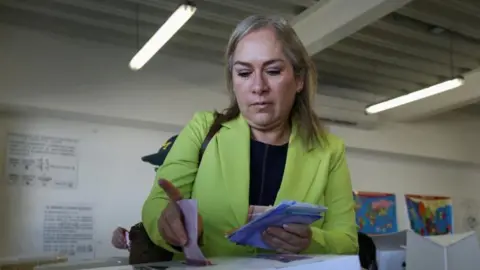Mexico and Central America correspondent
BBC News
 Reuters
ReutersA former defence lawyer for the jailed drug lord Joaquín “El Chapo” Guzmán has been elected as a judge in Mexico’s first-ever judicial elections.
Tallies published on Tuesday showed that Silvia Delgado had won enough votes to secure a position as a local criminal judge in the city of Ciudad Juárez, on the US-Mexico border.
Her candidacy was one of the most controversial in the election held on 1 June.
A leading transparency organisation accused Delgado of being one of several candidates with alleged links to organised crime on the ballot sheet, an accusation she dismissed vehemently, arguing that she had simply been doing her job by defending El Chapo.
The 51-year-old lawyer was part of the defence team for El Chapo before the notorious drug lord was extradited from Mexico to the United States in 2017.
The leader of the Sinaloa cartel was found guilty of drug trafficking in 2019 and is serving a life sentence in a supermax prison in Colorado.
In an interview with the BBC ahead of the election, Delgado argued that El Chapo was entitled to legal counsel and dismissed suggestions of a conflict of interest, should she be elected as a judge.
Following the publication of the voting tally on Tuesday, Delgado said she would refrain from commenting until her win had been officially confirmed.
The judicial election was the first of its kind to be held in Mexico following a radical reform brought in by the governing Morena party.
Its backers said electing judges – including Supreme Court justices – in a direct vote would make the judiciary more democratic and beholden to voters.
But its critics argued that it undermined the independence of the judiciary.
Turnout was low at 13% – the lowest in any federal vote held in Mexico – which many observers said showed that there was little enthusiasm among Mexicans for choosing judges directly.
However, President Claudia Sheinbaum said the election had been a resounding success.






















